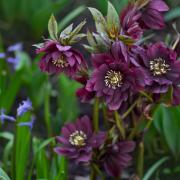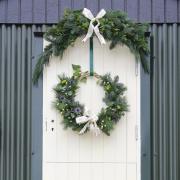10 things to do in the garden during December
Home-grown wreath
Get into the festive spirit by making your own wreath from holly, ivy, spruce, pine and stems of willow and dogwood, cotoneaster and Hellebores. You can use a ready-made wreath base or make your own from willow branches or metal wire. The more rustic the better to achieve that homemade look.
Sprouts out
You can harvest lots of veg for Christmas lunch, including parsnips, leeks and winter cabbages, all of which can be left in the ground until you need them for the freshest flavour. Harvest Brussels sprouts when they are around one inch in diameter, before they 'blow open'. Pick them from the base of the plant up, twisting them away from the plant.
Helping hand
The cold winter months can be a challenging time for our feathered friends. If you do just one thing this month, my top tip is to hang out a bird feeder. Fat-rich foods such as peanuts, suet products, sunflower hearts and even fruits will all be gratefully received. Keep a bird bath topped up with water too, as birds need to drink and bathe every day.
Tree tips
If you buy your Christmas tree early, leave it outside in a bucket of water and only bring it inside when you’re ready to decorate it. Take an inch off the bottom of the tree with a saw before you bring in, a bit like you do with freshly cut flowers. Don’t position your tree next to a fire or radiator as the needles will drop quicker. I always recommend a stand that holds water and top it up every day.
READ MORE: Gardening gift books for green-fingered fans: Christmas 2024

There are plenty of options to recycle your Christmas tree. Here at Barton Grange, you can leave your used trees and we will transport them to the Fylde Sand Dunes project to help provide an improved flood defence which benefits the local community and wildlife.
Winter pruning
It’s time to get the secateurs out for one final cut. Grapevines, autumn-fruiting raspberries, apple and pear trees, wisteria and Japanese maples are just some of the plants that benefit from a good winter prune. Try shredding the cuttings rather than burning them as not only is this better for the environment, but they also make a fantastic mulch that can be added to compost.
Clean sweep
Keep sweeping up leaves from your lawn, borders and paths with a rake or stiff brush. Remember to keep the greenhouse and shed gutters free or leaves and debris too.
Snow patrol
If we actually have a white Christmas, remember to shake snow off trees and shrubs as the weight of it can damage branches and stems. Don’t worry about snow on low plants because it protects them against hard frosts.
Mind the gap
Check newly planted trees and shrubs to see if they have been loosened by winds or lifted by frost. If this happens, gaps form around the roots causing them to dry out. If you see a crack around the plant, firm in again gently with your feet.
Spring goals
Now is the time to start planning for next year’s garden. Carefully plan your vegetable crop rotation to avoid a build-up of pests and diseases. Write up a list of fresh ideas for your borders and enjoy dreaming of next spring.

Helleborus niger
Commonly known as the Christmas rose, this gorgeous evergreen perennial bears beautiful white flowers throughout the winter months into early spring. It's perfect for growing at the front of a partially shaded border and makes an excellent cut flower – simply float the blooms in a bowl of water to display them.





























